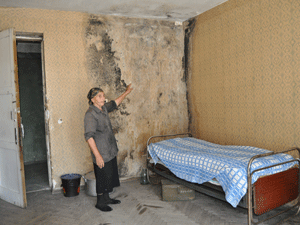Gela Mtivlishvili, Kakheti
“The Georgian authorities must do more than the bare minimum to provide adequate housing, employment and access to health care to those displaced as a result of the conflicts in the 1990s and the war with Russia in August 2008. Displaced people need more than just roofs over their heads,” – stated Nicola Duckworth, Europe and Central Asia Programm director of the international organization “Amnesty International.”
The report prepared by “Amnesty International” with the help of “Open Society – Georgia” states that the IDPs, displaced because of the Abkhazia war of 1990s, still live in “severe conditions”.
In the village of Nukriani, Signagi region, in the dormitory of former student camp, 8 families of IDPs live in severe conditions. They were given residence here in 1993, after leaving Gulripshi, Ochamchire, Gagra regions and Sokhumi.
“The building is in a terrible condition. The roof is damaged and the rooms get all puddled when it rains. The walls are being ruined because of the dampness. We’re afraid the whole building will break down killing us, but we have nowhere to go, so we are forced to stay here,” – said an IDP from Abkhazia, Lali Yurashvili.
“We have no water or gas, electricity wires are openly dispersed. The room doesn’t have a normal window or door. We live in intolerable conditions, but we can’t change anything. The help that we get from the state is only 22 lari. This is not enough for food. None of us is employed. We try to find some one-time jobs but they barely exist,” – notes Mariam Kharshilava.
With the help of the international society, the government of Georgia started implementing different programs for creating normal conditions for the IDPs. The government developed a special strategy that acknowledges the right of the local integration until the return of the IDPs is possible. The government adopted the state strategy implementation plan and started the process of the restoration of IDP’s residence places and registering it as their property.
According to IDPs residing in Nukriani, the Ministry of Refugees and Accommodation offered them residence places in Sagarejo, in the rehabilitated building, on which they expressed their consent, but later, after the 2008 August war, the IDPs from Shida Kartli were placed there and no place was left for them.
“As we know, this building, where we live now, is purchased and it has a private owner. In the recent period, the IDPs are massively evicted from different regions, and probably this will happen with us as well. We addressed the Ministry of Refugees and Accommodation, the President of Georgia as well with the request to conduct preliminary talks with us and make an agreement beforehand, but we got no response,” – say the IDPs.
The fact that the IDPs are not involved in the long-term decision making and implementation process, is confirmed by the fact that the IDPs evicted from Gurjaani, resort “Akhtala” started living in the rented accommodations after the eviction.
I43 IDP families from Abkhazia live in the first and second buildings of the resort “Akhtala.” The head of the Regional Agency of the Ministry of Internal Affairs, Levan Bitskinashvili, warned the IDPs of eviction on July 8, 2010 and gave 5 days for freeing the building. The term expired on July 15. The director of the resort “Akhtala” addressed the police with the request of eviction of IDPs. The resort “Akhtala” is a state enterprise. The police had received permission on the eviction of IDPs from the Ministry of Refugees and Accommodation. The Ministry is offering an alternative residence places in the villages of Bakurtsikhe and Lagodekhi of Gurjaani region to the IDPs from Abkhazia. But the IDPs are refusing to move to the buildings offered by the Ministry since their living conditions would be worsened. According to them, they were never asked their opinion when the building in the village of Bakurtsikhe was restored.
The lack of the dialogue and consultation is emphasized by “Amnesty International” as well. “The IDPs in Georgia have little chances for affecting the decision making process, that directly affects the usage of their economic and social rights,” – states the report.
One of the most severe problems for the IDPs is the health situation.
“Poverty as well as lack of income and poor housing conditions and marginalization negatively affects the general health of displaced people, exposing them to higher health risks and long term depreciation of health as well as limiting their overall ability to address health related problems. In addition, displacement and the trauma for those who flee from or remain trapped in conflicts and displacement often result in a variety of mental health disorders such as major depression, anxiety and stress disorders. The inadequate living conditions and malnutrition that are especially widespread among displaced people also increase susceptibility to diseases such as tuberculosis, diphtheria and anemia. The government-financed state insurance program, which benefits some displaced people who qualify as socially vulnerable, has gone some way to ensuring greater access to health care for the poorest, but it does not solve the lack of access to necessary healthcare completely. Its coverage is limited both in terms of services and benefits afforded as well as the coverage of its beneficiaries,” – states “Amnesty International” report.
The international organization calls on the government of Georgia to conduct consultations with the IDPs on the topics that will affect their lives, so that they can make their choice: “Amnesty International” addresses the government to ensure the long term accommodation compliance with the adequate living standards and put priority for those who need immediate attention.
News
December 13, 2023
Ethnic minorities outside the peace dialogue
November 6, 2023
‘Peace’ agenda of political parties
Popular
Articles
February 13, 2024




